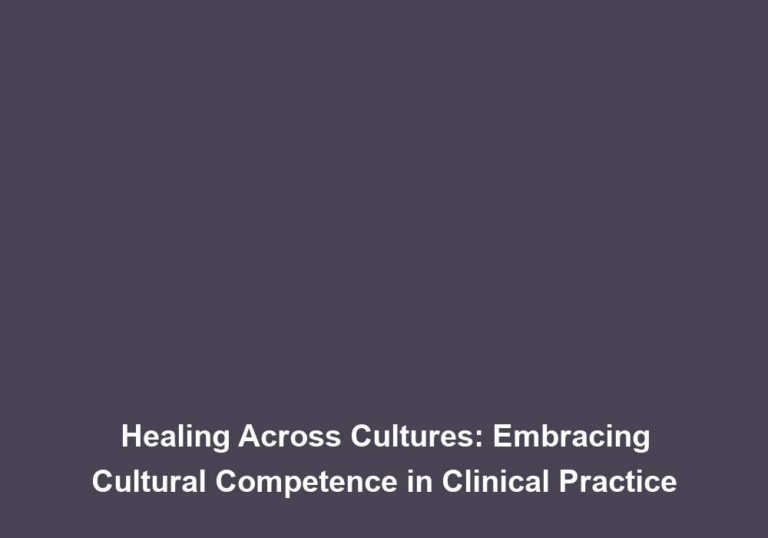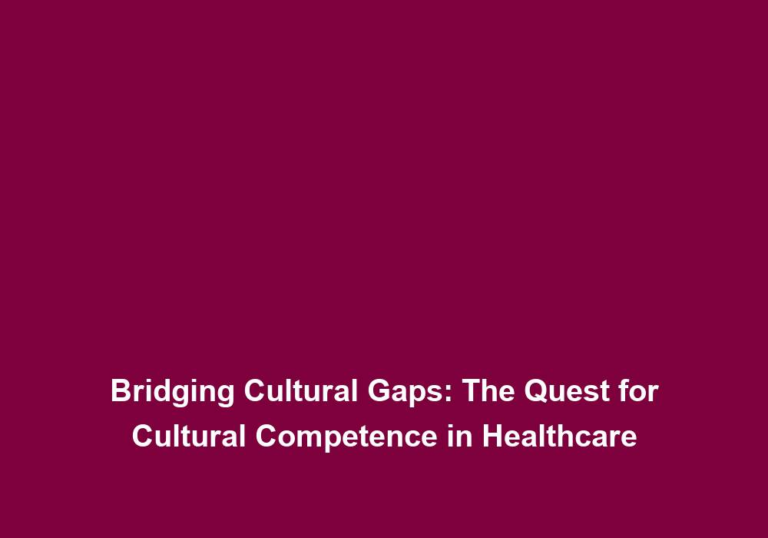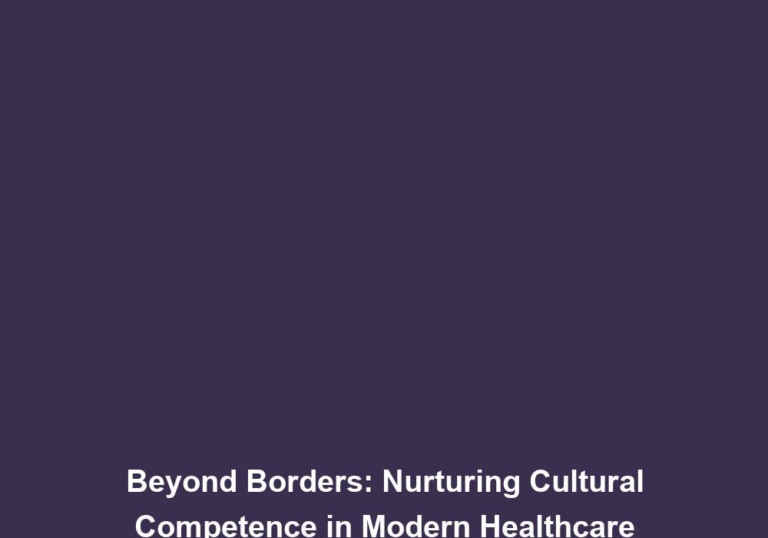A Spectrum of Healing: The Role of Cultural Competence in Diverse Patient Care
Healthcare is an essential aspect of human life, and providing quality care to patients from diverse cultural backgrounds is crucial. Cultural competence plays a vital role in ensuring that patients receive the care they need while addressing their unique values, beliefs, and traditions. In this article, we will explore the significance of cultural competence in diverse patient care and its impact on healthcare outcomes.
Understanding Cultural Competence
Cultural competence refers to the ability of healthcare providers to recognize, respect, and respond effectively to the cultural and linguistic needs of their patients. It involves understanding the influence of cultural factors on health beliefs and practices, as well as tailoring care to meet individual patient needs. By embracing cultural competence, healthcare professionals can bridge the gap between different cultural backgrounds, thereby promoting effective communication, trust, and ultimately improving patient outcomes.
Cultural competence goes beyond simply understanding different cultures; it requires healthcare providers to develop a deep awareness and sensitivity to the diverse perspectives and experiences of their patients. This involves educating themselves about different cultures, traditions, and beliefs, and self-reflecting on personal biases and assumptions. By continually striving to expand their cultural knowledge, healthcare providers can provide more inclusive and respectful care.
Benefits of Cultural Competence in Patient Care
- Improved Patient-Provider Relationship: Cultural competence fosters trust and rapport between patients and healthcare providers. When patients feel understood and valued, they are more likely to actively engage in their own healthcare, leading to better treatment adherence and overall satisfaction.
Building a strong patient-provider relationship is at the core of cultural competence. By taking the time to understand a patient’s cultural background and beliefs, healthcare providers can establish a foundation of trust. This trust encourages patients to openly communicate their needs and concerns, leading to a more collaborative approach to care. When patients actively participate in their healthcare decisions, treatment outcomes improve, and overall satisfaction increases.
- Enhanced Communication: Cultural competence facilitates effective communication between healthcare providers and patients from diverse backgrounds. By understanding cultural nuances, providers can ensure that information is conveyed clearly and appropriately, thereby reducing misunderstandings and potential medical errors.
Effective communication is the cornerstone of quality healthcare. When language and cultural barriers are present, healthcare providers must employ strategies to bridge these gaps. Using plain language, avoiding medical jargon, and utilizing professional interpreters or translation services are essential in ensuring accurate and effective communication. Additionally, active listening and empathy play a crucial role in making patients feel heard, understood, and respected.
- Reduced Disparities in Healthcare: Cultural competence plays a pivotal role in reducing healthcare disparities among diverse populations. By acknowledging and addressing cultural barriers, healthcare providers can ensure equitable access to quality care, regardless of a patient’s cultural background.
Healthcare disparities, such as variations in health outcomes and access to care, are a significant concern in diverse patient populations. Cultural competence helps address these disparities by recognizing and addressing the unique challenges and needs of different cultural groups. By actively working to eliminate barriers to care, healthcare providers can improve health outcomes and promote health equity for all patients.
- Tailored Treatment Plans: Cultural competence allows healthcare providers to develop individualized treatment plans that align with a patient’s cultural beliefs and practices. This approach increases treatment adherence and improves health outcomes, as patients are more likely to follow recommendations that resonate with their cultural values.
Every patient is unique, and their cultural background plays a significant role in shaping their health beliefs and behaviors. By conducting cultural assessments and understanding a patient’s cultural practices, beliefs, and preferences, healthcare providers can tailor treatment plans accordingly. This personalized approach ensures that patients feel respected and empowered, leading to increased treatment adherence and improved health outcomes.
Strategies for Culturally Competent Care
Achieving cultural competence requires a comprehensive approach that encompasses various strategies. Here are some key strategies that healthcare professionals can implement to provide culturally competent care:
1. Cultural Awareness and Sensitivity
Healthcare providers should strive to develop cultural awareness and sensitivity by educating themselves about different cultures, traditions, and beliefs. This self-reflection enables providers to recognize personal biases and avoid making assumptions based on cultural stereotypes.
Cultural awareness and sensitivity serve as the foundation for cultural competence. Healthcare providers must actively seek opportunities to learn about different cultures, engage in cultural humility training, and continuously reflect on their own biases and assumptions. This ongoing self-awareness allows providers to approach patient care with an open mind and a genuine desire to understand and respect diverse perspectives.
2. Effective Communication
Clear and effective communication is vital when providing care to diverse populations. Healthcare providers should use plain language, avoid medical jargon, and utilize interpreters when necessary. Active listening and empathy are also crucial to ensure patients feel heard, understood, and respected.
Effective communication is a skill that healthcare providers must continually refine and adapt to meet the needs of diverse patients. By using plain language, healthcare providers can ensure that information is easily understood by patients from different cultural backgrounds. Additionally, utilizing professional interpreters or translation services when language barriers are present is essential in facilitating accurate and meaningful communication. Active listening and empathy are equally important, as they create a safe space for patients to express their concerns and perspectives.
3. Respect for Diversity
Respecting and embracing diversity is fundamental to cultural competence. Healthcare providers should appreciate the unique strengths and perspectives that different cultures bring to the table. By acknowledging these differences, providers can create an inclusive and welcoming environment for patients from all backgrounds.
Respect for diversity goes beyond simply tolerating cultural differences; it involves actively valuing and celebrating them. Healthcare providers should strive to create an environment that promotes cultural inclusivity, where patients feel comfortable expressing their cultural needs and preferences. This can be achieved by displaying culturally diverse artwork, providing translated materials, and ensuring that staff members receive cultural competency training.
4. Cultural Assessment
Performing a cultural assessment allows healthcare providers to identify their patients’ cultural practices, beliefs, and preferences. This assessment helps tailor care plans to meet individual needs and ensures that cultural factors are taken into account when developing treatment strategies.
Cultural assessments are an essential tool in providing culturally competent care. By asking open-ended questions and actively listening to patients, healthcare providers can gain valuable insights into their cultural background and healthcare beliefs. This information enables providers to adapt their approach, develop personalized treatment plans, and address cultural factors that may impact patient care.
5. Collaboration and Teamwork
Cultural competence extends beyond individual healthcare providers. Collaborative efforts between healthcare teams, including nurses, doctors, social workers, and interpreters, are essential in delivering culturally competent care. By working together, healthcare professionals can provide holistic care that respects each patient’s cultural background.
Effective collaboration and teamwork are integral to cultural competence. Healthcare providers must recognize the value of interdisciplinary collaboration and actively involve other team members in patient care. This collaborative approach ensures that cultural competence is integrated into all aspects of care delivery, leading to improved patient outcomes and a more comprehensive understanding of diverse patient needs.
Overcoming Challenges in Cultural Competence
While cultural competence is invaluable in providing diverse patient care, it does come with its own set of challenges. Here are some common challenges healthcare providers may face:
Language Barriers
Effective communication may be hindered by language barriers, making it difficult to fully understand patients’ needs and concerns. Utilizing professional interpreters or translation services can help bridge this gap and ensure accurate information exchange.
Language barriers pose a significant challenge in culturally diverse healthcare settings. To overcome this challenge, healthcare providers should utilize professional interpreters or translation services to facilitate effective communication. These resources ensure that accurate information is exchanged, and patients feel heard and understood.
Ethical Dilemmas
Cultural competence may sometimes clash with ethical considerations, such as when cultural practices conflict with evidence-based medicine. In such situations, healthcare providers must navigate these dilemmas while respecting patients’ cultural beliefs and ensuring the best possible medical care.
Ethical dilemmas can arise when cultural practices and beliefs differ from evidence-based medicine. Healthcare providers must approach these situations with cultural humility and a commitment to patient-centered care. By engaging in open and respectful dialogue with patients, providers can work together to find a balance between cultural values and evidence-based practices.
Time Constraints and Resources
Providing culturally competent care requires additional time and resources, which may pose challenges in a busy healthcare setting. Investing in cultural competency training and allocating sufficient resources can help overcome these limitations and ensure the delivery of high-quality care.
Time constraints and limited resources can hinder the implementation of cultural competence in healthcare settings. To address this challenge, healthcare organizations should prioritize cultural competency training for all staff members. Additionally, allocating sufficient resources, such as interpreters and translated materials, demonstrates a commitment to providing culturally competent care.
Conclusion
Cultural competence is a crucial component of providing diverse patient care. By understanding and embracing cultural differences, healthcare providers can foster trust, improve communication, and reduce healthcare disparities. By implementing strategies such as cultural awareness, effective communication, and respect for diversity, healthcare professionals can enhance patient outcomes and contribute to a more inclusive and equitable healthcare system. Embracing cultural competence is not only a professional responsibility but a gateway to a more connected and compassionate healthcare community.







